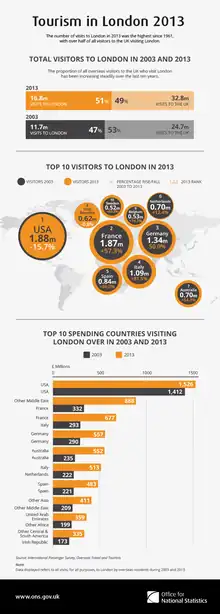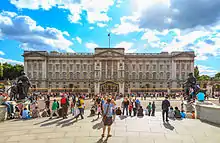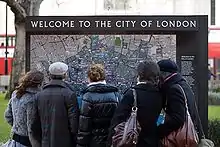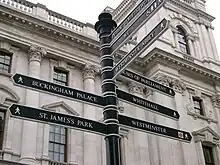




London, the capital city of England, is one of the world's most visited cities in terms of international visits. It is home to an array of notable tourist attractions, attracting 20.42 million international visitors in 2018,[1] an additional 27.8 million overnighting domestic tourists in 2017,[2] and 280 million day-trippers in 2015.[3][4]
Effect on the economy
The travel and tourism sector in the United Kingdom contributed GBP66.3 billion to the gross domestic product (GDP), 3.4% of total GDP in 2016 and is expected to rise by 2.2% pa, from 2017 to 2027, to GBP84.6 billion, which could comprise up to 3.6% of the total GDP in 2027.[5]
In 2011, visitors to London spent £9.4 billion, which is a little more than half of the total amount international visitors spent in the whole of the United Kingdom the same year.[6]
A 2013 study by Deloitte and Oxford Economics concluded that the tourism sector employed 700,000 people, accounting for 11.6 per cent of London's GDP.[7]
Notable attractions
The London Eye is a giant Ferris wheel located on the edge of the River Thames. It is 135 metres tall and has a diameter of 120 metres. A short walk away, the area is home to the London Aquarium, Elizabeth Tower, the Houses of Parliament, Westminster Abbey and Nelson's Column. In 2013, the tallest building in London, The Shard, opened a viewing platform to the public. Other major tourist attractions in London include the Tower of London, Buckingham Palace (although this is only open to the public during a limited number of months in the summer), Tower Bridge Experience, Madame Tussauds, ZSL London Zoo, London Dungeon and St Paul's Cathedral.
The Association of Leading Visitor Attractions reported that the following were the top 10 visitor attractions in 2017:[8]
- British Museum – 5.9 million visits
- Tate Modern – 5.7 million
- National Gallery – 5.2 million
- Natural History Museum, London – 4.4 million
- Victoria and Albert Museum – 3.7 million
- Science Museum, London – 3.3 million
- Southbank Centre – 3.2 million
- Somerset House – 3.2 million
- Tower of London – 2.8 million
- Royal Museums Greenwich – 2.6 million
Museums and galleries
There are many museums and art galleries in the London area, the majority of which are free to enter. Many of them are popular places for tourism. In addition to Tate Modern and the National Gallery, notable galleries include Tate Britain and the National Portrait Gallery.
Parks and open spaces
London has several parks for tourists to stroll, rest and relax in. They include Hyde Park, Regent's Park, Green Park, St. James's Park, Hampstead Heath and Greenwich Park.[9]
Economics

London attracted 16.8 million foreign visitors in 2013, they accounted for 51.4% of all visitors.[10] Below is the visitors information:
- France 1,904,000
- United States 1,878,000
- Germany 1,295,000
- Italy 1,072,000
- Spain 866,000
- The Netherlands 687,000
- Australia 687,000
- Republic of Ireland 611,000
- Belgium 531,000
- Sweden 516,000
Public transportation
Public transportation is essential in bringing tourists to and from attractions, and deciding the means of and cost of their travel.[11] London's transportation can also be an attraction in itself.[12] London offers many forms of public transportation: the Underground (commonly referred to as the Tube), double-decker red buses, and taxis.[13] Tourists can purchase Travelcards to take the Tube, bus, or overground trains through designated zones.[14]
References
- ↑ Simon Kyte (May 2012). Tourism in London (PDF). Greater London Authority. p. 11. ISBN 978-1-84781-496-8. Archived from the original (PDF) on 28 February 2013. Retrieved 10 March 2013.
- ↑ "Domestic overnight stays in London 2008-2017 | UK Statistic". Statista. Retrieved 28 March 2019.
- ↑ "London and Domestic Tourism" (PDF). VisitBritain.
- ↑ "London Tourism Report 2015" (PDF). London and Partners. Archived from the original (PDF) on 6 December 2021.
- ↑ "UNITED KINGDOM2017 ANNUAL RESEARCH: KEY FACTS" (PDF).
- ↑ "Record Year as 19 million tourists visit London". London Evening Standard. May 2017. Retrieved 14 July 2017.
- ↑ "A Tourism Vision for London" (PDF). London and Partners.
- ↑ "London's top tourist attractions see visitor numbers fall". BBC News. 16 March 2018.
- ↑ "Best parks in London". visitlondon.com.
- ↑ "[ARCHIVED CONTENT] 16.8m overseas visits to London in 2013, up 43.5% in 10 years - ONS".
- ↑ Inkson, Clare; Minnaert, Lynn (4 April 2012). Tourism Management: an introduction. Sage. p. 53. ISBN 978-1-84860-869-6.
- ↑ Le-Klähn, Diem-Trinh (September 2014). Stefan Gössling; Colin Michael Hall; Daniel Scott (eds.). The Routledge Handbook of Tourism and Sustainability. Routledge. p. 441. ISBN 978-0-415-66248-2.
- ↑ Lazo, Luz (3 May 2014). "How do transit systems in London, Paris compare with Washington's Metro?". The Washington Post. Retrieved 28 April 2020.
- ↑ "Visitor tickets". Transport for London. Retrieved 16 August 2018.
External links
 London travel guide from Wikivoyage
London travel guide from Wikivoyage- Tourism in London